

AP® English Language
The ultimate guide to 2016 ap® english language frqs.
- The Albert Team
- Last Updated On: March 1, 2022
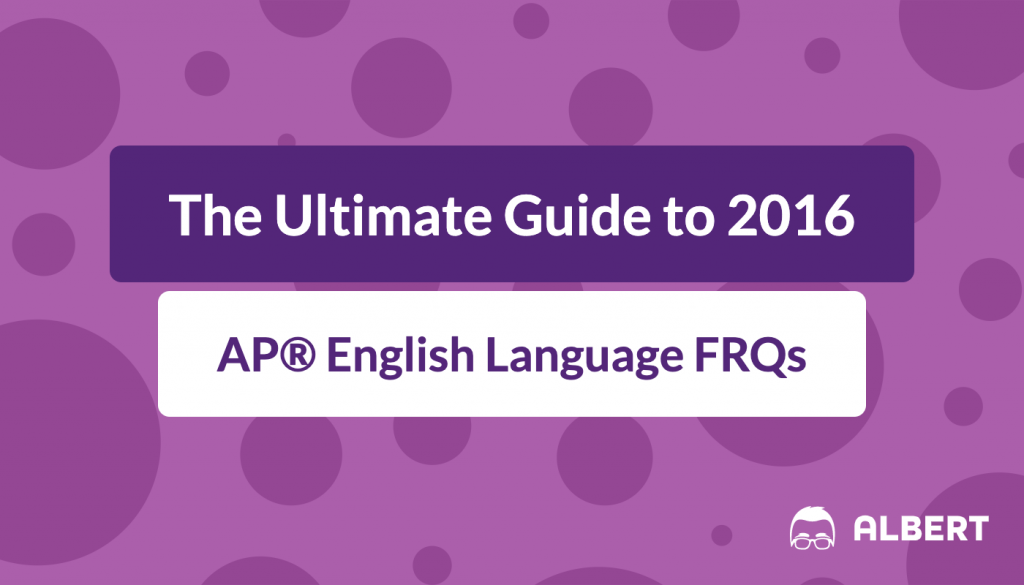
Introduction to The Ultimate Guide to 2016 AP® English Language FRQs
Do you remember the last time you took a standardized test? If you do, you probably remember feeling nervous before the test. You were probably sitting patiently in your seat, waiting for the proctor to say go, and this feeling of overwhelming dread was settling on you.
It is entirely normal to feel nervous before a test. If you think about it, taking any test is a lot like being the first explorer to cross into uncharted territory. You have no idea what awaits you on the next page, and you are unsure of your readiness. The question is: what can we do to change it?
One of the key things you can do to eliminate that nervous energy before the test is to study. You can learn the layout of the exam, the primary skills you need to prepare and ensure you are ready for what is on the next page. That is why this guide exists, to walk you through the 2016 Free Response Questions from the AP® Language exam.
If you stick to the skills and tips given in this AP® Language FRQ guide it will go a long way towards preparing you for the test; the first step is to learn how the test breaks down.
Test Breakdown
The Free Response Questions (FRQs) are the essay portion of the AP® Language exam. The exam itself has two parts, the first is a multiple choice section, and the second is the FRQs. This guide provides an overview, strategies, and examples of the FRQs from the CollegeBoard. There is a guide to the multiple choice here .
The FRQ section has two distinct parts: 15 minutes for reading a set of texts and 120 minutes for writing three essays. The 15 minute “reading period” is designed to give you time to read through the documents for question 1 and develop a thoughtful response. Although you are advised to give each essay 40 minutes, there is no set amount of time for any of the essays. You may divide the 120 minutes however you want.
The three FRQs are each designed to test a different style of writing. The first question is always a synthesis essay – which is why they give you 15 minutes to read all of the sources you must synthesize. The second essay is rhetorical analysis, requiring you to analyze a text through your essay. The third paper is an argumentative essay.
Each essay is worth one-third of the total grade for the FRQ section, and the FRQ section is worth 55% of the total AP® test. Keep that in mind as you prepare for the exam, while the multiple-choice section is hard, the essays are worth more overall – so divide your study time evenly.
The scale for essay scores ranges from 1-9. A score of 1 being illegible or unintelligible, while a score of 9 is going to reflect the best attributes and aspects of early college level writing. You should be shooting to improve your scores to the passing range, which is 5 or above. Note that if you are struggling with the multiple choice section, a 9-9-9 on the essays can help make up for it.
The Tale of Three Essays
If you are currently taking an AP® class, you have probably experienced the style and formats of the three assignments. You may have learned about the specifics of the different types of essays in class, and you may have already found out which of the three is easiest for you. However, you must possess skill in all three to master the AP® test.
The First Essay (Synthesis)
The first essay on the test is going to be the synthesis essay . This essay can be the trickiest to master, but once you do get the hang of it, you will be one step closer to learning the others. The synthesis requires you to read six texts, which can be poems, articles, short stories, or even political cartoons.
Once you have read and analyzed the texts, you are asked to craft an argument using at least three of the documents from the set. The sources should be used to build and support your argument, and you must integrate them into a coherent whole.
On the 2016 FRQ section of the AP® exam, the synthesis essay focused on the decline of foreign language learning in English speaking countries. The complete prompt for the section is below:
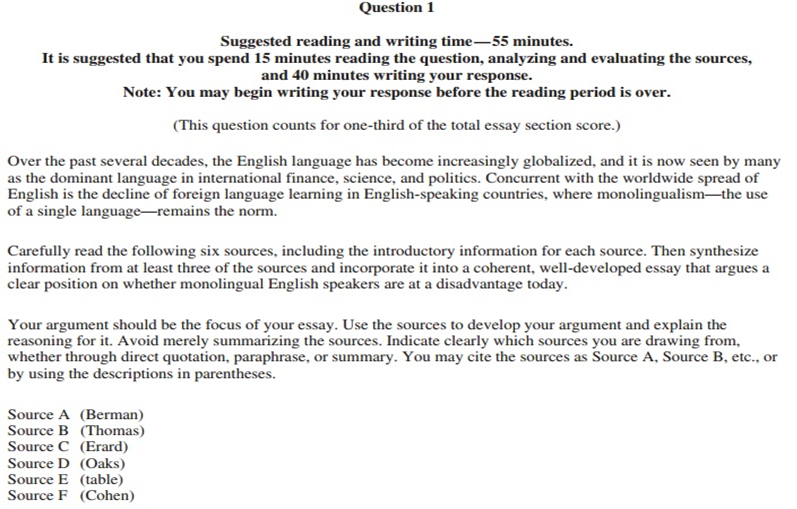
If we break down the task, it is asking you to use the six sources to create a “coherent, well-developed argument” from your own position on whether or not monolingual English speakers are at a disadvantage in today’s world. As you read this you might have some experience with the issue; perhaps you have discussed it in your foreign language or English classes. You can use that experience, but your response needs to focus on the given texts.
To find the actual documents you can go here . Taking a look at the documents will provide some context for the essay samples and their scores.
The question is scored on a scale from 1-9, with nine being the highest. Let’s take a look at some examples of student essays, along with comments from the readers – to break down the dos and don’ts of the FRQ section.
You should always strive to get the highest score possible. Writing a high scoring paper involves learning some practices that will help you write the best possible synthesis essay. Below are two examples of what you should do taken from student essays.
Connect Your Sources and Reasoning
One of the things you should do is make an explicit connection between the sources given and your reasoning. When you utilize the sources provided, make sure you are giving enough details and information to connect them to your arguments effectively. Let’s look at a student example:

Examining the example above we can see how a high scoring essay integrates the sources provided with their commentary and arguments. Notice that the student blends the source materials from source A with their arguments showing the benefits of multilingual learning in the current workforce.
The student starts with the specific argument that “English speakers who can communicate with those who speak other languages are at a great advantage in their professional lives.” The student then uses the two pieces of information from source A (increasing the strength of their industry, and making themselves more employable) to provide proof for their claim.
To score high, ensure that you explicitly connect your argument in each paragraph to the sources you are using as support.
Have at Least One Source per Reason
The second thing you should do to earn a high score on the first essay is organize the sources you use into different reasons you can use to argue your claim. Let’s look at how a high-scoring student organized her ideas:

Notice that the student was able to create three strong reasons from the information given in the sources. One of the best skills you can pick up while you practice for the AP® Lang FRQs is to choose sources that will allow you to create a coherent argument with clear reasons behind it.
There are some practices that students should avoid on FRQ 1 of the test. Students who do these things can expect to receive low scores on their essays, and if you wish to score above a five, you should avoid them at all costs.
Don’t Misread the Sources
Do not misread the information that a source is providing. Students will sometimes think that they can use a source to argue a point that it doesn’t support, those students are wrong. Every person grading the AP® Lang FRQs has read and is intimately familiar with the source material on the test, so fooling them is not an option. Let’s look at an example:

This student misreads the source and tries to fit the evidence from the article in a place that it doesn’t fit. The argument that Berman makes in his article has very little to do with reassuring that “an individual’s culture is best for them” – and the evidence that the student offers doesn’t make any mention of choosing a best or better culture.
In the source, Berman is offering an alternative reason why someone might learn a language in contrast to the argument that learning languages should be entirely utilitarian. When you are writing your essay ensure that you always read the text correctly.
Don’t Give Inadequate Detail

If you notice in the example above the student doesn’t elaborate on the evidence in much detail. The student mentions some general ideas like that the human brain becomes “smarter, faster, and wittier…” as a result of second language acquisition, but the student doesn’t provide much explanation of how that happens, or why that even matters to their argument about the value of language acquisition.
When you are working on your test make sure that you adequately explain the evidence you use. Make explicit connections between the evidence, and your argument. Any source that is left unexplained will count against you in the long run.
AP® Readers’ Tips:
- Read every text before you start your essay. One of the pitfalls of many students is that they do not use enough sources and try to fit them in after the fact.
- Plan ahead. Ensure that you understand what you are going to be saying and how you will incorporate the different sources into your writing. You will need at least three sources to get above a 6, so ensure you have at least that many mapped in your plan.
The Second Essay (Rhetorical Analysis)
The second essay on the FRQ section is always a rhetorical analysis essay. This essay will focus on analyzing a text for an important aspect of the writing. In the case of the 2016 FRQ, the analysis was supposed to concentrate on rhetorical strategies:

The prompt asks the reader to carefully read the eulogy presented by Margaret Thatcher in honor of Ronald Reagan, and write an essay analyzing the rhetorical strategies she uses in the speech. Rhetorical strategies are things like the rhetorical appeals, and rhetorical devices.
Let’s examine the do’s and don’ts for the second essay.
Utilize Specific Examples from the Text in Your Analysis

In this high scoring essay, the student analyzes the text very effectively. The student points out how Thatcher uses precise diction, a rhetorical device, to get her point across. In this case, it is the idea that Thatcher is trying to “twist perception in her favor” by using the specific words “evil empire” when referring to Russia.
The student goes into further detail with their explanation that this choice in diction also allows Thatcher to show the “similarities in thinking” between the British and American peoples. This level of insight shows that the student has a distinct command of the material.
Using this level of detail in your analysis will ensure you score higher on the exam. It would be prudent then, to explain each piece of text you use in greater and more precise detail.
Whatever you identify in the text for your analysis, you should be able to point out precisely how it supports your main point. The more depth you can give in your analysis, the more accurate you can be with your comments, the better you will do.
Use Outside Knowledge Effectively to Strengthen Your Argument
The ability to pull in outside knowledge from your classes or books you have read will help enhance your analysis and can make it look like you know a lot more about the text itself. Let’s take a look at how a student did this on the 2016 exam:
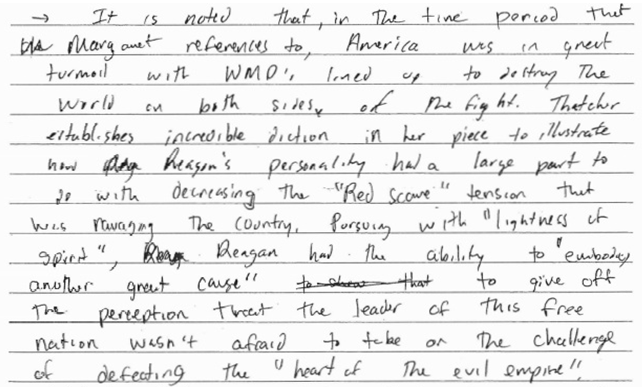
In the example above, the student can provide a more in-depth analysis of Thatcher’s words by connecting her mention of the cold war to background knowledge of what the cold war meant to many Americans at the time.
The student can flesh out the meaning behind Thatcher’s words because the student understands so much about the cold war. The student can comment on how people felt during specific events and connect that to Thatcher’s words about the actions of President Reagan.
Whenever possible, bring in background information that will help with your analysis. It might only seem like extra knowledge about the topic or author, but it could provide some insight into why they chose to write about something or show the full effect of their argument.
Some things to avoid on the literary analysis essay include specific examples of evidence from the text, and understand the rhetorical strategies that you point out.
Don’t Fail to Provide Specific and Supportive Evidence from the Text
Everything you assert about the text should be supported by specific examples. Let’s look at an example of a student essay that fails to provide specific examples:

The student who wrote this essay doesn’t give their analysis the time or detail that it requires to be well done. The student glosses over the “evidence” by stating that the example of pathos (a rhetorical strategy) can be found in “lines one and two,” but they don’t ever give a specific example.
It is unfortunate that the student fails to provide a specific example, because if Thatcher is using pathos that would be a quality rhetorical strategy that the student could explain. The student’s failure to provide specific examples of text left them to only write a very general and simplistic analysis. The student doesn’t explain why Thatcher wants to be “showing her strong emotion for Ronald Reagan” or what that would do to the audience.
Overall, the student’s lack of both textual evidence and analysis led to their receiving a low score.
Don’t Try to Examine Rhetorical Strategies that You do not Understand
If you are pointing out a particular rhetorical strategy in the text, you need to make sure that you know how that strategy works. Here is an example of a student that tried to use a strategy they didn’t understand:

This student tries to point out how Thatcher uses logos (an appeal to logic) in her eulogy. However, the student says that Thatcher’s use of logos “makes her a credible source” which, while it is an indirect effect of using logos – is not the main goal when using factual or logical arguments.
If Thatcher’s desire was to make herself a credible source, she would have used ethos in her eulogy, because that is an appeal to the character of the speaker – having to do directly with credibility.
In your essay, make sure that you understand the rhetorical strategies you point out, and explain how those strengthen the author’s argument. The explicit connection between the strategy and the argument must be made to explain the effect of the strategy.
AP® Readers’ Tips
- Pay attention to both the holistic (overall) and analytic (particular) views of the piece. You will need to understand both the text as a whole and the specific parts of the text to analyze it effectively.
- Don’t just analyze the rhetoric used, but instead connect the rhetoric to the specific purpose that the author hopes to achieve through their speech. This rule applies to any rhetorical analysis essay.
The Third Essay (Argument)
The third and last essay of the FRQ does not respond to a particular text. Instead, the prompt focuses on crafting an argument about a particular issue. Your essay will need to argue a particular position, though most of the questions put forth by the exam will not be simple either/or questions.
Let’s look at the prompt for the third essay from 2016:
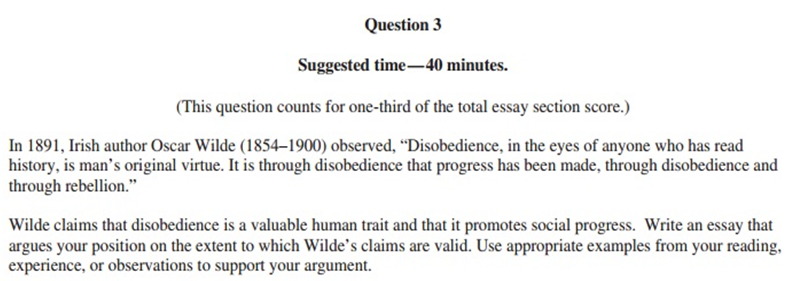
Before we get into the do’s and don’ts of the essay, let’s talk about the particular challenge of this task. You are presented with a scenario, in this case, it deals with disobedience as a means to create social progress, and you are asked to create an argument about that issue.
For 2016, the scenario asks you to argue what part disobedience plays in social progress. You are asked to explain the extent to which Wilde’s claims are valid, and use evidence from sources of your reading, observation, and experience.
A few of the most important things you can do to ensure you score well on the essay include using an analogy to make your claim more clear and thoroughly connect the evidence you provide to your claim.
Use Analogy to Clarify Your Claim
Though it is tricky, one of the most effective strategies to show you have a command of language and understand the rudimentary skills required for crafting an argument is to use an analogy to introduce your claim. Let’s look at an essay that uses the strategy of analogy very well:
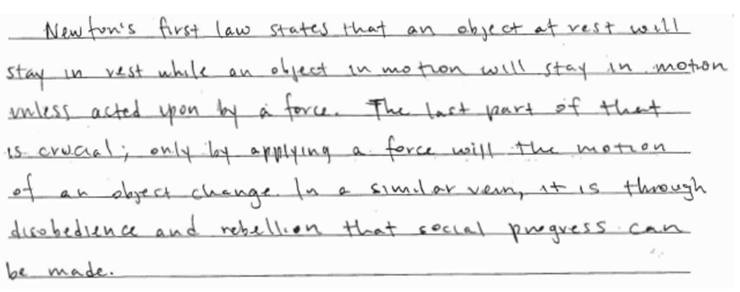
Instead of a very definite thesis statement, this student chooses to go with an analogy in their introduction. They still provide us with a claim, “… it is through disobedience and rebellion that social progress can be made” but they don’t lay out exactly how they are going to argue it.
The analogy itself, comparing social change through rebellion to Newton’s first law of motion works to make the rest of their argument more coherent. The idea that to change the trajectory of an object it must be acted on by a force provides a great model for thinking about social change – like the essay is going to establish through the rest of their writing.
If you can utilize analogy effectively in your writing, it can work to make your writing clear to the reader. Beyond clarity, it will show you have a command of the English language and argumentative strategies.
Make Explicit Connections between Your Evidence and Claim
The best essays are going to make clear and convincing connections between the evidence they provide and the claim they are trying to support. If there are no explicit connections made between the evidence and the argument, the entire essay will be unconvincing and result in a low score.
Let’s take a look at one example of how this connection works:
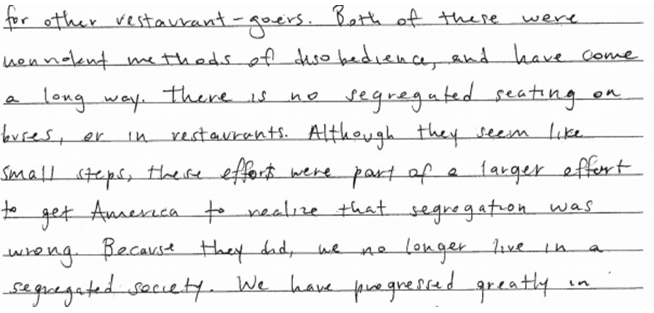
The student does a very good job connecting their evidence (the social change brought about by non-violent protests during the civil rights movement) and their claim (that social change happens through rebellion). The connection is demonstrated very well through their explanation, and they expand on the ideas in the subsequent sentences.
The sentence, “Although they seem like small steps, these efforts were part of a larger effort to get America to realize that segregation was wrong” demonstrates the students understanding of how their evidence supports the claim of the essay. It also shows that they can break down their argument, and ensure it stands up to criticism (that the boycotts didn’t end segregation).
Overall, this student can effectively connect their evidence to the claim which resulted in a higher score.
If we take a look at the essay samples from 2016 FRQ, there are few examples that stand out as don’ts. In particular, you should avoid misunderstanding the evidence you use, and the use of unnecessary information and phrases.
Don’t Fail to Explain Your Evidence
When you are making an argument, and it is based solely on your experiences and reasoning, it can be easy to get bogged down in the details and fail to explain your evidence adequately. You need to take your time and ensure you make clear connections between your evidence and claim.
Let’s take a look at a sample from an essay that fails to explain its evidence:
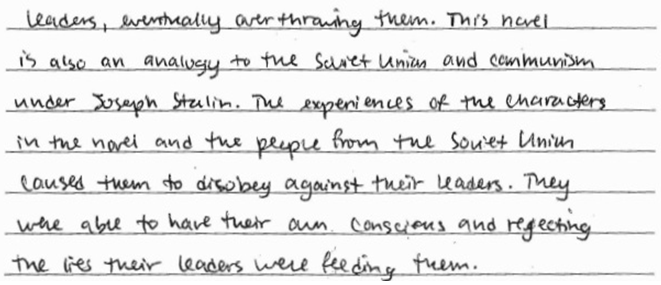
The essay presents the novella Animal Farm as evidence. However, it fails to explain how it is evidence. In the passage above, the student says that the novel is an analogy of the Soviet Union and Communism but then says that the characters in the novel and the people in the Soviet Union caused them to disobey against their leaders.
This example is a wholly confusing paragraph. First, the question arises of who the characters and Soviet Union are causing to rebel. Second, it doesn’t explain how this shows that rebellion brings about social progress. In the novella, which many of the essay graders will have read, the animals rebel, and it eventually leads to tragedy.
This student uses a source they don’t quite understand and as a result fails to argue their point effectively. You must uses sources that you understand in your essay, and the sources you use must be directly related to your argument – unlike this student’s use of animal farm.
Don’t Use Illogical Sentences
It can be difficult to make sense when you are under time pressure, but your sentences must make sense in the context of your essay. Here is an example from a low scoring essay with sentences that don’t make sense:
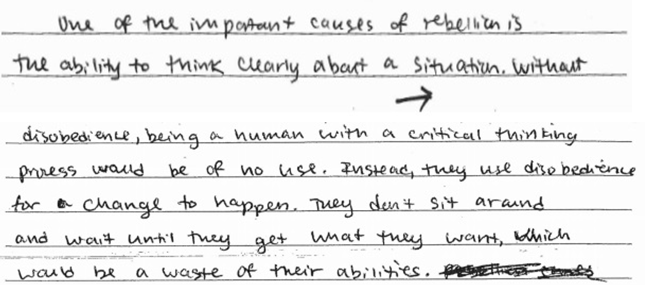
The student begins the paragraph by talking about how critical thinking is necessary for rebellion, which may be true. However, this has nothing to do with showing how rebellion leads to social progress.
As you read the rest of the paragraph, the student focuses more on how critical thinking is a valuable quality that shouldn’t be wasted, not on how it works to advance social change through rebellion.
If you cannot think of an argument that supports your claim, then find evidence that supports an argument or reason you wrote about earlier. Unrelated reasons and arguments do not help you score high.
- Keep track of all parts of the prompt. One of the easiest ways to drop points is to forget to answer an important aspect of the prompt. In the case of the 2016 prompt, the essay needs to talk about the value of Wilde’s idea and argue about the role of rebellion in social progress.
- Try to reference literary examples in your writing. Using things you have read provides a chance to go into more depth and detail about what you are writing.
General Tips from AP® Graders
- Make a plan. One of the best things you can do for any essay you are writing under a time crunch is to make a thought-out plan. Sometimes, in the heat of writing, it is easy to forget where we are in our arguments. Having a simple outline can save you from that misfortune.
- Answer the question in your introduction, and be direct. Directly answering the prompt is one of the easiest ways to ensure you get a higher score.
- Clearly, indent your paragraphs, and ensure that you always have an easy to navigate structure. Topic sentences are a must, so make sure those figure into your structure.
- Use evidence especially quotes from the texts, and explain what they mean. You need to make an explicit connection between the evidence you use, and how it supports your points.
- Part of all great writing is variety. Vary your sentence structures, don’t make all of your sentences short or choppy, but instead try to inject some creativity into your writing. Utilize transitions, complex sentences, and elevated diction in your writing.
- Use active voice, and make every word add to the paper as a whole. Avoid fluff; you don’t want your paper to look irrelevant because you are trying to pad your word count.
Go Forth and Conquer
Now that you better understand the expectations of the AP® Language and Composition FRQ section, you are one step closer to getting your five on the exam. Take what you have learned in this guide, and work on applying it to your writing. So, now it is time to go practice to perfection.
If you have any more tips or awesome ideas for how to study for the AP® Lang FRQ add them in the comments below.
Looking for AP® English Language practice?
Kickstart your AP® English Language prep with Albert. Start your AP® exam prep today .
Interested in a school license?
Popular posts.

AP® Score Calculators
Simulate how different MCQ and FRQ scores translate into AP® scores

AP® Review Guides
The ultimate review guides for AP® subjects to help you plan and structure your prep.

Core Subject Review Guides
Review the most important topics in Physics and Algebra 1 .

SAT® Score Calculator
See how scores on each section impacts your overall SAT® score

ACT® Score Calculator
See how scores on each section impacts your overall ACT® score

Grammar Review Hub
Comprehensive review of grammar skills

AP® Posters
Download updated posters summarizing the main topics and structure for each AP® exam.

Interested in a school license?

Bring Albert to your school and empower all teachers with the world's best question bank for: ➜ SAT® & ACT® ➜ AP® ➜ ELA, Math, Science, & Social Studies aligned to state standards ➜ State assessments Options for teachers, schools, and districts.

Choose Your Test
Sat / act prep online guides and tips, every ap english language and composition practice exam.
Advanced Placement (AP)

With the AP English Language and Composition exam coming up, it's important to find the best practice resources, and that includes practice tests! The AP Language and Composition exam has two sections: a multiple-choice section with 45 questions, and a free-response section with three essay questions—one synthesis prompt, one analysis prompt, and one argument prompt.
But not all AP Lang practice tests are like the real exam, and they aren't all of equal quality. In this guide, I'll break down where you can find official College Board AP Language and Composition practice test resources, other free resources out there, and paid practice tests and questions. I'll also break down which resources are high-quality and how to best incorporate AP English practice tests into your exam preparation.
A Note on Exam Updates
In 2019, the College Board announced updates to the AP English Language exam . The free-response section stayed the same, although there were some changes to how the essays will be scored .
For the multiple-choice section, there are now only 45 questions instead of roughly 55. Passages are also shorter, and there is a new question type, called "composition questions." They make up roughly half of the questions on multiple choice and test students on their ability to "read like a writer" and properly revise texts. Vocabulary-in-context questions and identification questions no longer appear on the exam. ( To learn more about different AP Language question types, check out our guide .)
So what does this mean for you? Unfortunately, it means that any AP Language practice resource created before 2019 is out of date. However, that doesn't mean they still aren't valuable resources. Free-response prompts and passages remain the same. When using older multiple-choice resources, stop answering questions after 45 questions and skip any vocab-in-context and identification questions you see.
Looking for help studying for your AP exam?
Our one-on-one online AP tutoring services can help you prepare for your AP exams. Get matched with a top tutor who got a high score on the exam you're studying for!

Official Practice Resources
The best practice test resources come from the College Board. This is because they are the ones who create and administer all AP exams, including AP Lang and Comp, so their materials are the closest to the real, actual questions you will be seeing on test day!
If you practice with material that's close to the actual exam, you'll feel more comfortable when you are actually taking the test. Therefore, when possible, it's best to use College Board materials. However, it's worth noting that official resources for AP Language and Composition are a little bit sparse, especially when compared to the AP Literature exam.
There are, in general, three resources that the College Board offers for any given AP exam: complete released exams, released free-response questions from previous years, and sample questions from the " AP Course and Exam Description. "
Complete Released Exams
Unfortunately, the College Board doesn't appear to have released any official complete AP English Language and Composition practice exams, so I have nothing to link to here. However, you might be able to find at least one entire past exam by Googling "AP Language complete released exam" or similar variations on that. Make sure any AP Language and Composition released exams you get this way have answer keys, though!
You might also ask your AP teacher if she has any copies of old AP exams you can use for practice. AP teachers can purchase past exams from the College Board that students don't have access to. She may not be able to let you take them home, but even then you could be allowed to use them in a supervised setting.
Released Free-Response Questions
The College Board has posted years and years worth of past AP Language and Composition free-response questions that are at your disposal for practice purposes. However, only the tests from 2007-onward include the same three question types that are on the test currently. (And again remember that the rubrics for grading these questions have changed, even though the questions themselves haven't.) Earlier tests include two rhetorical analysis questions instead of a synthesis question.
Sample Questions From the " AP Course and Exam Description "
Beginning on page 115, the AP Course and Exam description for AP Language and composition includes 17 multiple-choice questions and three free-response prompts: one synthesis prompt, one analysis prompt, and one argument prompt. As mentioned above, this is the only current source of official practice questions for the new "composition" question type, so make sure to check this resource out!

Put them in your question bank!
Free Unofficial Resources
Outside of the College Board, there are lots of sites offering free practice questions for the AP Language and Comp exam. But which ones will actually help you? Since anyone can slap together a few questions and call it an "AP Language and Composition Practice Test," how do you sort the wheat from the chaff?
I've combed through tons of free resources so you don't have to! Presented in order of quality, from best to worst, here's my list of all the free AP Language practice tests and quizzes I could find out there.
College Countdown Complete AP Language Practice Test
College Countdown offers a nearly-complete unofficial practice test, essays and all. While the exact wording of the multiple-choice questions isn't exactly the same as on a real AP exam, the tasks are very similar and the passages are well-selected. The essays are solid examples of the AP essay prompt style, although you could also substitute the unofficial free-response section for an official past free-response question if you wanted to make the experience even closer to a real AP. Also, there are robust answer explanations. This is an especially good resource given that there isn't an official College Board-released exam for this test.
High School Test Prep AP Language Practice Tests
High School Test Prep offers four short practice tests, each offering questions about a given nonfiction passage. The question style is definitely different from that of true AP questions; like the Albert questions below, they are written in a more stylistically simplistic way. Also note that these practice tests haven't been updated for the current version of the exam.
The ratio of questions about the passage overall versus specific moments in the passage is weighted much more heavily towards overall passage questions than the real AP exam. However, these are still decent rhetorical analysis practice questions, and this resource is an especially good choice if you find yourself struggling with identifying the major themes and arguments of passages overall.
Varsity Tutors AP English Practice Tests
Varsity Tutors offers very short, skill-specific quizzes. The questions don't sound all that much like AP questions, and every question asks about a different short passage, which is a little bit bizarre and inefficient. Additionally, not all of the specific skills they offer quizzes in are super-relevant to AP Language (e.g. "Motives and goals of characters"). However, if you feel like there are very specific rhetorical techniques you are confused about, taking some of the quizzes here could be a good study strategy. If you want to track your scores, you can make a free account with Varsity Tutors, but it's not necessary to be able to access the quizzes.
4tests.com AP English Language Exam
This site offers a 38-question AP English Language and Composition practice exam. The questions are somewhat overly basic and passages are not particularly similar in style or content to actual AP Language passages, though. Additionally, the interface is a little bit clunky. I would only use these if you desperately need some extra, very basic rhetorical analysis practice. (It's also not updated for the newest version of the exam.)
Crack AP English Language Tests
Crack AP has a plethora of AP English Language "tests" (that are actually short quizzes), however; we don't recommend them as a resource to use. They're based on outdated versions of the AP exam and don't cover many of the skills you'll actually see on the AP test. Feel free to skip this resource.

Clunky like a retro calculator.
Paid Unofficial Resources
If you need even more practice, there are also paid unofficial practice test resources available.
Albert AP English Language Practice
Albert offers a large number of mini-quizzes on analyzing the rhetoric of various notable nonfiction passages. Some of their questions don't match the tone of actual AP Lang questions, but they are one of the few resources to have practice composition questions. You need to create an account to use this resource, and while some questions you can access for free, for others you need a paid subscription.
Review Books
Review books usually contain one or more complete practice tests and are a great resource when you run out of free resources. Not all review books are equally high-quality, though—be sure to look at reviews (and check out the questions by flipping through the book at the bookstore if you can, to see how similar they are to actual AP questions). As a starting place, Barron's and the Princeton Review both generally offer high-quality AP review books.
Peterson's AP Practice Tests
A plan costs roughly $50 a month for access to all of Peterson's resources. For AP English Language, they have two practice tests. I couldn't find much information or reviews as to the quality of the material, though, so this is a bit of a gamble. You'd likely be better off buying a well-reviewed review book with practice tests.
How to Use Practice Resources in Your Exam Prep
How to best use practice resources as you study depends a lot on what kind of practice material you are using. I'll review how to make the most of different types of resources here.
Complete Practice Exams (Official and Maybe Unofficial)
The best way to use complete practice tests is to do full timed practice-runs for exam day. Bring a clock, a timer, and a hefty supply of pencils into a quiet room and have at it! A practice-run will help you to feel more comfortable when it's time to take the exam for real in May.
If you have access to multiple practice tests, you can even take complete tests at different times in the studying process to see how you've improved and what you still need to work on. When you do take practice tests, it can be helpful to get someone else to help grade your free-response essays based on the rubric.
You should aim to take your first full-length practice test around the beginning of your second semester. Normally I advise to only use official College Board practice tests for this, but since easily accessible complete official exams for the AP Language and Composition exam are sparse, you may want to supplement with the practice test from College Countdown linked to above.
Official College Board Practice Free-Response and Sample Questions
Released free-response questions from past years are best for practicing specifically for the free-response section in a targeted way. You can work on the prompt types that you find the most difficult or practice outlining essays in a certain amount of time, or writing all three essays in 120 minutes.
If you don't use the Course and Exam Description as a practice test, the multiple choice questions are great targeted practice for the first section of the text. It will help you get familiar with the College Board's question style and work on your rhetorical close-reading.
Unofficial Practice Quizzes and Questions
Unofficial practice quizzes and questions just aren't going to be as much like the real AP exam as College Board materials. However, while they aren't as helpful for prepping for the exam format or question styles, they are still good practice for building your rhetorical analysis skills, which is critical for the exam. High-quality unofficial resources are definitely worth your time.

Building rhetorical analysis skills: more complicated than building with blocks.
Key Takeaways
Practice tests are a key AP prep resource. The best resources come from the College Board, but unfortunately, official College Board resources for AP Language and Composition are a little bit sparse as compared to some other AP exams. However, there are also tons of unofficial resources, and some are high-quality. Most are free, but a few are paid.
Once you have your resources assembled, you might not be sure how to use them. Complete practice tests are best for mimicking the experience of the actual exam, sample Official questions are best for targeted section practice, and unofficial practice tests are best for rhetorical analysis skill-building.
You're ready to practice your way to AP success!
What's Next?
We also have complete practice test lists for AP Literature , AP US History , AP Chemistry , AP Biology , AP Psychology , and AP World History . Or see our guide to finding the best AP practice tests for any exam .
Taking the AP Literature exam? See our ultimate guide to AP Literature . for everything you need to know to ace this test.
Wondering if you should be trying for a perfect AP score ? See how difficult it is to score a 5 and the best tips to get you there!
Want to improve your SAT score by 160 points or your ACT score by 4 points? We've written a guide for each test about the top 5 strategies you must be using to have a shot at improving your score. Download it for free now:

Ellen has extensive education mentorship experience and is deeply committed to helping students succeed in all areas of life. She received a BA from Harvard in Folklore and Mythology and is currently pursuing graduate studies at Columbia University.
Student and Parent Forum
Our new student and parent forum, at ExpertHub.PrepScholar.com , allow you to interact with your peers and the PrepScholar staff. See how other students and parents are navigating high school, college, and the college admissions process. Ask questions; get answers.

Ask a Question Below
Have any questions about this article or other topics? Ask below and we'll reply!
Improve With Our Famous Guides
- For All Students
The 5 Strategies You Must Be Using to Improve 160+ SAT Points
How to Get a Perfect 1600, by a Perfect Scorer
Series: How to Get 800 on Each SAT Section:
Score 800 on SAT Math
Score 800 on SAT Reading
Score 800 on SAT Writing
Series: How to Get to 600 on Each SAT Section:
Score 600 on SAT Math
Score 600 on SAT Reading
Score 600 on SAT Writing
Free Complete Official SAT Practice Tests
What SAT Target Score Should You Be Aiming For?
15 Strategies to Improve Your SAT Essay
The 5 Strategies You Must Be Using to Improve 4+ ACT Points
How to Get a Perfect 36 ACT, by a Perfect Scorer
Series: How to Get 36 on Each ACT Section:
36 on ACT English
36 on ACT Math
36 on ACT Reading
36 on ACT Science
Series: How to Get to 24 on Each ACT Section:
24 on ACT English
24 on ACT Math
24 on ACT Reading
24 on ACT Science
What ACT target score should you be aiming for?
ACT Vocabulary You Must Know
ACT Writing: 15 Tips to Raise Your Essay Score
How to Get Into Harvard and the Ivy League
How to Get a Perfect 4.0 GPA
How to Write an Amazing College Essay
What Exactly Are Colleges Looking For?
Is the ACT easier than the SAT? A Comprehensive Guide
Should you retake your SAT or ACT?
When should you take the SAT or ACT?
Stay Informed
Get the latest articles and test prep tips!
Looking for Graduate School Test Prep?
Check out our top-rated graduate blogs here:
GRE Online Prep Blog
GMAT Online Prep Blog
TOEFL Online Prep Blog
Holly R. "I am absolutely overjoyed and cannot thank you enough for helping me!”

IMAGES
VIDEO
COMMENTS
Download free-response questions from past exams along with scoring guidelines, sample responses from exam takers, and scoring distributions. If you are using assistive technology and need help accessing these PDFs in another format, contact Services for Students with Disabilities at 212-713-8333 or by email at [email protected].
Test Breakdown. The Free Response Questions (FRQs) are the essay portion of the AP® Language exam. The exam itself has two parts, the first is a multiple choice section, and the second is the FRQs. This guide provides an overview, strategies, and examples of the FRQs from the CollegeBoard. There is a guide to the multiple choice here.
Essays earning a score of 1 meet the criteria for the score of 2 but are undeveloped, especially simplistic in their explanation and argument, weak in their control of language, or especially lacking in coherence and development. Sample Z Score 2 Wilde’s claim that disobedience is a valuable human trait and that it promotes social progress is
2016 AP ° ENGLISH LANGUAGE AND COMPOSITION FREE-RESPONSE QUESTIONS The much more important issue involves getting beyond instrumental thinking altogether, at least in the educational sphere. Second language acquisition is a key component of education because it builds student ability in language as such.
Visit the College Board on the Web: www.collegeboard.org. AP® ENGLISH LANGUAGE AND COMPOSITION 2016 SCORING GUIDELINES. Question 2 (continued) 3 Essays earning a score of 3 meet the criteria for the score of 4 but demonstrate less success in analyzing the rhetorical strategies Browning uses to petition Napoleon.
The prose generally conveys the student’s ideas but may be inconsistent in controlling the elements of effective writing. Question 2 (continued) 3 – Essays earning a score of 3 meet the criteria for the score of 4 but demonstrate less success in analyzing the rhetorical strategies that Thatcher uses to convey her message.
7– Essays earning a score of 7 meet the criteria for the score of 6 but provide more complete explanation, more thorough development, or a more mature prose style. 6– Adequate. Essays earning a score of 6 adequatelyargue a position on whether monolingual English speakers are at a disadvantage today. They develop their argument by adequately ...
Beginning on page 115, the AP Course and Exam description for AP Language and composition includes 17 multiple-choice questions and three free-response prompts: one synthesis prompt, one analysis prompt, and one argument prompt. As mentioned above, this is the only current source of official practice questions for the new "composition" question ...